Through proactively looking for way to innovate and develop more efficiencies in staffing and operations, the city of Phoenix’s Public Works Department is the driving force that has resulted in the implementation of new solid waste programs for the convenience of customers, the growth of public-private partnerships to achieve a common waste diversion goal and the development of a project that invites waste-to-new products manufacturers to Phoenix.
The city of Phoenix, AZ’s Solid Waste Division, operated by the Public Works Department, has provided trash and single-stream recycling services for 25 years to Phoenix residents. The city owns two transfer stations, each with a materials recovery facility (MRF), as well as a 2,600-acre landfill located in Buckeye, AZ, 60 miles away from the downtown core. The Solid Waste Division is divided into three sections: Field Services, Diversion and Disposal Services, and Community Engagement Services.
Field Services is responsible for the collection of trash and recycling from approximately 395,000 households in Phoenix. This section employs more than 300 employees, which includes drivers, foremen, supervisory staff and administrative staff. Field Services uses 193 side-loader trucks, 44 rear-loader trucks and 43 tractors. This section also provides a quarterly bulk trash collection, as well as a green organics curbside collection.
The Diversion and Disposal section is responsible for the diversion of recyclable materials and disposal of trash. This section manages the two city-owned transfer stations, the city’s SR-85 Landfill, five closed landfills and oversees the management of the two MRFs. This section currently has 118 vehicles and off-road equipment and employs 109. Currently, the materials accepted in Phoenix’s recycling program are: cardboard, paper, food boxes, mail, beverage cans, food cans, glass bottles, glass and plastic food jars, plastic jugs and plastic bottles with caps on. In the near future, this section will have oversight on a composting facility that will process food scraps and green organics waste.
The Community Engagement Services section provides the collection of trash and recyclables during special community or high profile city events and special operations. The section also provides educational outreach to residents about waste diversion, bulk trash rules, container placement, alley collection, etc. The section employs 53 specialists who do community and educational outreach, 21 solid waste equipment operators for special events and operations beyond residential services, and 32 other staff members who work in the call center or are assigned to do barrel deliveries.
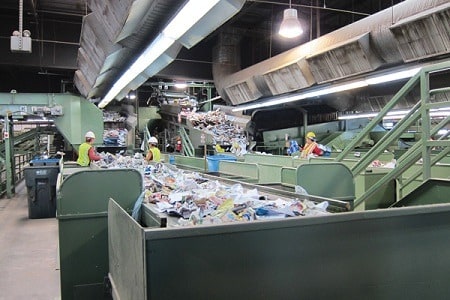
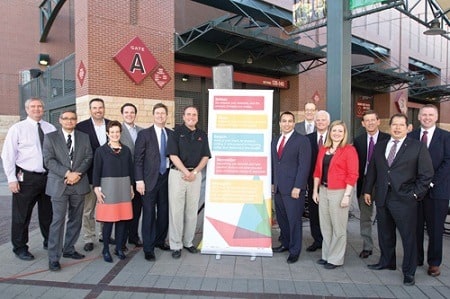
Proactive Innovations
Fortunately, the status of the economy for the past several years has not affected the Phoenix Public Works Department because staff has proactively sought innovations and efficiencies in staffing and operations. One example in particular is the implementation of the “New Way, Same Day” program in 2012 that allowed the department to pick up trash containers and recycling containers on the same day (previously, trash and recycling were collected on two different days).
The implementation of this program required a well-coordinated transition process that included Public Works operations staff to make major changes to the truck routes as well as to make contingency plans for the impact of “return trips” to residents who had forgotten about their new day of collection. “As we all know, changing behavior is a very challenging task, but through direct mailers, knock-and-talks, countless community presentations, and the assistance of local and social media, 390,000 households learned their new assigned day of collection after a few months. This “New Way, Same Day” program also resulted in fuel and vehicle maintenance savings, as well as efficiencies in staffing,” says John Trujillo, Phoenix Public Works Director.
The recent temporary downturn in the commodities market has given rise to anti-recycling messages that emphasizes the overall decrease in value of recyclable materials. Despite the recent downturn, the city continues to educate residents on the importance of recycling, focusing on two messages: 1) recycling is good for the environment because it preserves our limited (and dwindling) natural resources, and 2) revenue from recycling may be on the decline but diverting materials from the landfill still results in overall savings from landfill, fuel, and vehicle maintenance costs. Two months ago, the city re-energized its recycling campaign by launching Top 10 in the Bin in partnership with Keep America Beautiful. Since its launch, the importance of recycling is once again at the forefront in Phoenix, but this time, not only reiterating what can be recycled in the city’s program, but also what should not be placed in their blue recycling containers.
Services and Dedication
The Division’s newly hired solid waste equipment operator (SWEO) trainees complete a six-week drivers training program incorporating classroom and field operation training. Each new class of SWEO trainees are educated on the State of Arizona CDL requirements, City of Phoenix policies and procedures, operator safety, solid waste equipment and solid waste operations. Retraining occurs when an identified SWEO is in need of additional training or a refresher training related to their duties, especially those who have been involved in minor and major accidents. As a preventative measure, the city also offers ongoing safety training that includes training modules, tailgate meetings and annual field evaluations. SWEOs are required to attend these meetings and complete training modules as stated in their yearly performance measures sheet.
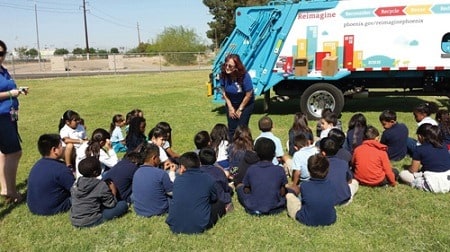
Training Modules
Online training modules, specifically created by safety training staff, are available to effectively communicate safety information to SWEOs. A kiosk is stationed at each region to access training modules online. All SWEOs are required to complete a module each month. The minimum required passing score for each module is 80 percent. SWEOs have two opportunities to pass each module or must complete training with their regional safety supervisor. Performance is recorded on a regional tracking sheet.
Tailgate Meetings
Tailgate meetings are informal safety meetings conducted at each jobsite prior to the start of a work shift. Supervisors provide training on road hazards, operational processes, equipment, tools and environmental considerations in order to inform workers of the risks and safe practices while operating. Tailgate meetings occur bi-monthly and are coordinated by the assigned regional Safety Supervisor.
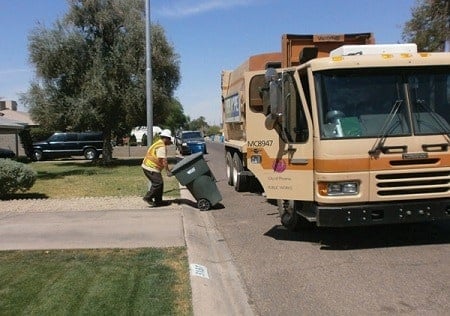
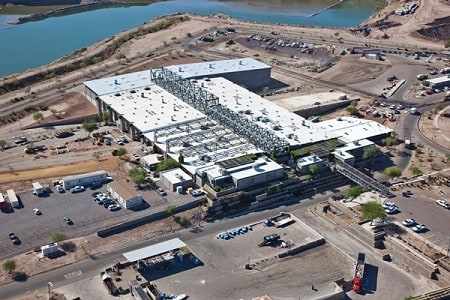
Annual Field Evaluations
Supervisors and Training Foremen conduct an annual ride-along with each SWEO to evaluate their performance. Upon completion of the field evaluation, the reviewer meets with the SWEO to provide feedback, recognition and recommendations for identified areas of improvement.
Educating the Public
As mentioned, Phoenix Public Works has not only recently launched a recycling campaign called Top 10 in the Bin that re-educates residents about what materials can be recycled in the city’s program, what materials are considered contaminants in the city’s recycling program and the environmental impacts of recycling our resources, but they have also created a short video that lists the top 10 materials, distributing this on all of the department’s social media channels, as well as on the city’s own cable channel programming. The department also has placed strategic digital ads on Facebook and certain local popular Web sites promoting the one minute video and driving targeted audiences to the Web page with important recycling content. The department’s Public Information Division has sent a news release about the new campaign to local and national media. “In the short time since its launch in March, local radio, TV and publications have featured stories with different angles on recycling, and even City Council members are showing their support of the campaign by agreeing to talk about the importance of recycling to their constituents,” says Trujillo. Public Works specialists are actively distributing the Top 10 in the Bin flyers to residents, at Phoenix events and during their waste diversion presentations to the community. All materials, including the video, are both in English and Spanish.
The Community Engagement Services section also has dedicated specialists who meet with residents and the community on a regular basis to educate them on various aspects of waste diversion. These specialists are often invited to neighborhood association meetings, different community meetings, school and community events to discuss the city’s solid waste programs, city codes regarding bulk trash and container placement, as well as the principles of recycling and waste diversion, to name a few. During large, high-profile events, such as the Super Bowl, the College Football Playoff and the NCAA Basketball Championship game, the specialists are asked to assist event-goers on how to properly sort their waste materials at the event.
“To prepare for future challenges, the city of Phoenix is collaborating with its partners to adopt a long-term and viable solutions for solid waste management and to implement best practices that demonstrate good stewardship of our limited resources,” says Trujillo. “Because Phoenix’s waste diversion programs are all voluntary, education and community outreach play an important role in our waste diversion efforts. We realize that educating more than 390,000 households about the right way to divert waste and the different programs the city offers is a huge undertaking. We rely on our partners, such as Goodwill of Central Arizona, Arizona State University’s Walton Sustainability Solutions Initiatives (WSSI), Recycled City and various neighborhood associations, to name a few, to help us extend our educational reach to their networks.”
Additionally, the city’s partnership with WSSI goes beyond educational outreach because it has created the Resource Innovation and Solutions Network (RISN). Launched in July 2014, RISN is a partnership between ASU and the city of Phoenix that establishes a global resource network for partners to tap into for best practices and project development. The partnership still focuses on education in sustainability, but on a much more global level.
Reimagine Phoenix
“Solid waste management is a basic service that a city must provide to its residents and the department bears the operational and financial burdens of managing the material and our resources,” explains Trujillo. “We recognize that the practice of landfilling is not a sustainable solution for our city and must find other ways to minimize our consumption, reuse our resources and decrease our dependency on landfilling.”
That is why in 2013, the city launched the Reimagine Phoenix initiative, with a clear goal of increasing the city’s waste diversion rate to 40 percent by 2020. The initiative uses a three-pronged approach to reach the 40 percent waste diversion goal: 1) enhancement or implementation of new solid waste programs for residents, 2) expansion of community and educational outreach and 3) development of key public and private partnerships. Trujillo says, “The Reimagine Phoenix initiative has gained the support of our policy makers, local and national businesses, higher education institutions and the community to work together to find sustainable alternatives to managing solid waste.”
The most significant development thus far is the Resource Innovation Campus (RIC), where waste-to-new product businesses are welcome to house their manufacturing facilities in Phoenix-owned land near the city’s transfer station. The RIC will also house an incubator for new ideas for waste management and technology that will be managed by our partners from Arizona State University. “With the RIC, we hope to find new ways to reuse and repurpose the city’s problem solid waste materials, while stirring up the local economy,” says Trujillo.
The Reimagine Phoenix initiative has allowed the department to think out of the box, and find solutions to Phoenix’s solid waste concerns. It has been the driving force that resulted in the implementation of new solid waste programs for the convenience of customers, the issuance of RFPs seeking innovative ideas that could help the city divert problem materials from the landfill, the growth of public-private partnerships to achieve a common waste diversion goal, and the development of the RIC project (mentioned above) that invites waste-to new products manufacturers to Phoenix.
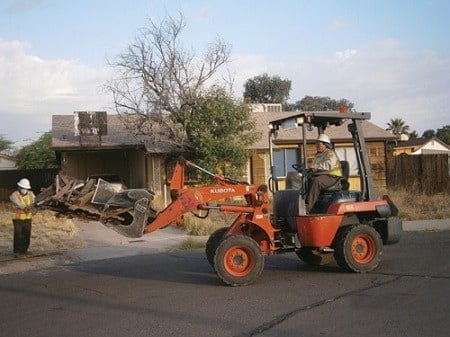
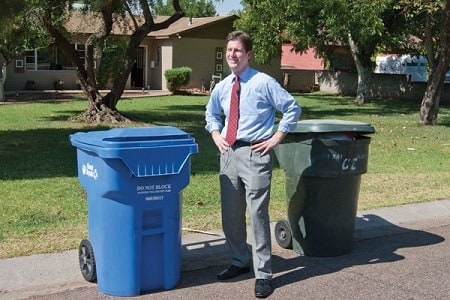
Looking Forward
Currently, through an RFP process, the City is not only looking to award a contract to a deserving company that can turn palm fronds into a new product, they are also looking to future RFPs for various waste-to-product ideas from businesses that will be headquartered in the RIC. According to Trujillo, “By the end of 2016, we are looking forward to the opening of a brand new composting facility that will allow the city to create a more sustainable and robust organics collection program. Currently, 50 percent of residential garbage is composed of compostable materials. The new composting facility will help divert compostable materials from the landfill and get Phoenix closer to its 40 percent waste diversion goal by 2020.” | WA
For more information, contact Yvette Roeder, Public Information Officer, at (602) 262-5099 or via e-mail at [email protected].
